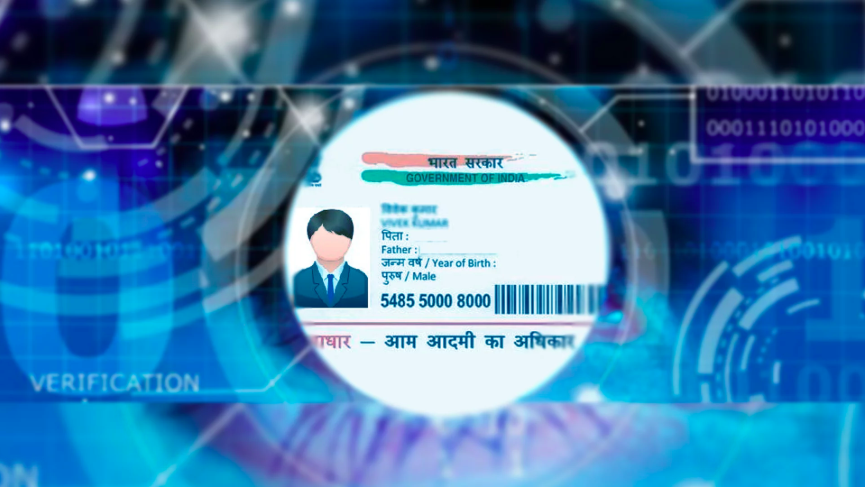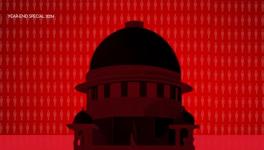Aadhaar Judgement - SC Upholds Act, Key Sections Struck Down

The Supreme Court today struck down sections 33(2), 57 and 47 of the Aadhaar (Targeted Delivery of Financial and Other Subsidies, Benefits and Services) Act 2016.
“The judgement today has stopped Facebook and Google-like signing up for people,” said lawyer Prasanna S., commenting on the historic Aadhaar judgement today.
Also Watch: Will the Aadhaar Judgment Become Another ADM Jabalpur?
The 12-digit Unique Identification Number is no longer compulsory for services including the opening of bank accounts, cell phone services, passport and even driving licenses. With over a billion Indians already signed up for Aadhaar, the contentious court battle over the constitutionality of it has finally come to an end after the hearing went on for a record 38 days over 27 petitions.
While the five-judge bench headed by Chief Justice Dipak Misra affirmed its constitutionality, the majority judgement given by Justice Sikri has struck down key sections from the Aadhaar Act.
The Sections and their implications
Section 57
The Section 57 of the Act was a key provision of contention and has now been struck down. The provision allowed not only the state but also any "body corporate or person" or private entity to demand Aadhaar from citizens for the purpose of identification. It was this provision that allowed statutory support to mobile companies, private service providers, banks, payments services to seek an individual's Aadhaar card for identification. With the section being struck down the private players can no longer ask for biometric details of the customers. The SC made it explicitly clear that “No mobile company can demand Aadhaar card”. Essentially, citizens won't need to link their Aadhaar cards with banks or mobile numbers. Justice Sikri, in his judgement, found this section to be unconstitutional.
Section 57 reads: “Nothing contained in this Act shall prevent the use of Aadhaar number for establishing the identity of an individual for any purpose, whether by the State or any body corporate or person, pursuant to any law, for the time being in force, or any contract to this effect: Provided that the use of Aadhaar number under this section shall be subject to the procedure and obligations under section 8 and Chapter VI.”
Striking down this provision was deemed crucial to prevent private entities from collecting one’s data, to prevent exploitation of data to distort markets, or to restrict its use for commercial purposes such as marketing or selling personalised ads and manipulating human behaviour. By striking this provision down, the Court has made it difficult for the government to share data with the private parties. However, this is done under the garb of the larger assumption that the government itself is benevolent and as long as the data is leak or duplication free it would not be problematic for the government to continue with the Aadhaar project.
While the move is being lauded across the spectrum, it does bring with itself a drawback- the private entities, if excluded from the process of Aadhaar verification, might not be able to participate in the process of welfare programmes undertaken by the government. For example, if the state wants to provide subsidised rice to a particular village and the process requires Aadhaar verification, Tata may be willing to help in the process, however, the company may not be able to help with the Aadhaar verification process as it is a private entity. Therefore, in places where the government does not have enough access, it may be prove to be a drawback in terms of expanding the accessibility of welfare benefits and entitlements with the help of private entities.
Section 33 (1)
Section 33(1) has been read down. This essentially has now prevented very junior judges below the rank of district judges from allowing investigative agencies to access Aadhaar data collected by UIDAI. Additionally, this makes sure that the discretion exercised is with some thought. However, again the assumption is that district judges are qualified to undertake the balancing test, if they follow the privacy guidelines laid down in the Puttaswamy judgement. Since the judgement is recent and the privacy discourse primitive, district judges as well may not be fully equipped to handle these concerns.
The national security provision has also been read down (scope has been narrowed down) to some extent. Section 33 of the Aadhaar Act refers to disclosure of information in certain cases. The Supreme Court has read down Section 33(1) while striking down 33(2). Section 33(1) allows disclosure of information, including identity and authentication records, if ordered by a judge not inferior to that of a District Judge. Reading down this subsection, the SC has said individuals should be given the opportunity of hearing.
Section 47
The judgment has struck down Section 47 of the Act, which stated that criminal complaints for data breach can be filed only by UIDAI. The exclusion of individuals from filing complaints was held to be arbitrary. Speaking with NewsClick, Professor Agnidipto from National University of Juridical Sciences (NUJS), explained, “The prime focus needs to be on the data principal or the owner of the data. However, in the absence of a data protection law, the individual now has to solely rely on the Aadhaar act.”
While the striking down of these provisions is being welcomed, there are some critical questions that remain. A major contention of the judgement has been given by Justice Chandrachud who has dissented against the judgement today. Commenting on it, he questioned, “What about the data that has already been collected?” He went ahead to suggest that the data already acquired from over a billion people should be destroyed, however, there is no mechanism to do so and no supervising authority.
Professor Agnidipto also added, “The way in which data was collected previously by the government from the people despite court orders, was a blatant contempt of the court and set a dangerous precedent.”
The route of the Money Bill taken to pass the bill was also given legitimacy by the Court today which could also open the flood gates for other majoritarian governments to use this judgement as a plank to push for other policies.
Get the latest reports & analysis with people's perspective on Protests, movements & deep analytical videos, discussions of the current affairs in your Telegram app. Subscribe to NewsClick's Telegram channel & get Real-Time updates on stories, as they get published on our website.
























